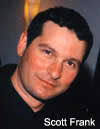
LOOKOUT, THE
April 30th, 2004

Script Review: THE LOOKOUT
by Darwin Mayflower
WARNING: SPOILERS!
(10/04/00)
NOTE: The screenplays we review are often in development and may experience many rewrites, some could end up being completely different than what is reviewed here. It is our hope that our reviews generate more interest in the film. Thank you.
Caught a look at Scott Frank’s latest script -- THE LOOKOUT. It’s been a hot property over at DreamWorks for a few years now. And AMERICAN BEAUTY director Sam Mendes has been circling it like a hungry dog since his Oscar-winning film wrapped.
Frank’s career got a tremendous boost a few years back because of his adaptation of Elmore Leonard’s surefire hit GET SHORTY. He also penned the script for Leonard’s OUT OF SIGHT. And since he’s now the Leonard adapter of choice, he’s sure to get the job for the SHORTY sequel -- BE COOL.
Frank’s been taking steady assignments (SAVING PRIVATE RYAN, FLIGHT OF THE PHOENIX, MR. 3000, MINORITY REPORT) since his recrudescence in the biz. But hasn’t written an original till now, with THE LOOKOUT. It’s always interesting to see how a writer comes back to his own work after working on others’ for so long.
And I think this time around, with Frank, working alongside Elmore Leonard so long has affected his writing in a deep, negative way. Frank won armloads of awards for OUT OF SIGHT (which was really just Leonard’s book on the screen with a little playing around with the timeline from Steven Soderbergh). THE LOOKOUT might be Frank’s way of trying to recapture that acclaim with his own words.
But instead the Leonard influence has derailed what could have been a small, engaging film.
THE LOOKOUT introduces us to Chris Pratt, a former star athlete in high school who, one night, driving recklessly, hit a wheat thresher and killed his best friend, the best friend’s girlfriend, injured himself and his own girlfriend. The girlfriend walks away minus one leg. Chris’ head takes a knocking and his IQ drops along with his popularity. He can no long remember simple, everyday things and must keep a notebook with him at all times so he doesn’t forget to lock the front door or not touch a scalding pot.
He lives with a blind man named Lewis. Lewis is sightless but self-reliant and takes care of Chris (by always cooking for him and leaving a note so Chris will remember how to reheat it, for instance).
They coexist in their strange little universe: Chris leaving post-it notes everywhere to remember how to shower; Lewis blasting Mahler and keeping up a never-waning sense of good cheer.
For the first sixty or so pages of this script (after the opening, which incomprehensibly shows us the ending) the script reads like RAIN MAN meets HAROLD AND MAUDE. A "character study" about two people, with separate ailments, who get on in life despite them. Frank appears to know what he’s talking about and the fine details -- that make something so precarious like this work -- are all present.
Which is what makes the second half of the script such a shock. Chris gets involved in a bank robbery. A stereotypical "tough-guy mobster" recruits the blank Chris to help them rob the bank Chris works at.
This is where Frank goes full-out Leonard, with lots of showy dialogue and flashy, sudden violence. But he doesn’t quite have Leonard’s skill for creating realistic, funny-in-their-naughtiness criminals.
Frank is eventually reduced to conventional Hollywood moves like car chases and having someone kidnapped for The Loot from the Big Job. Think there’s gonna be a twist ending? This is also Leonardesque: someone gets shot -- the end. Leonard works from character first; his plots are all but pointless. It’s all about the people and what they say and how they act. Which is why Leonard always ends his books with someone being knocked off unexpectedly: his out-of-control, looping plots were never headed anywhere in the first place and when he’s done with his story he just ends it.
THE LOOKOUT in a certain way reminded me of THE CELL. Only in the fact that we once again have a great premise ruined by the desire to write a Hollywood-Approved Screenplay. In that case Mark Protosevich showed us this absolutely fascinating form of schizophrenia where the person actually lives in a dream world. But all he could come up with as a story was another in the long, boring, sad line of serial killer movies.
Just think what could have been done with this. If he had stuck to normal people dealing with real issues. A similar story, about a different-but-comparable type of malady, was actually written. It was called IMAGING NATHAN. And it was a deeply affecting, sweet script. But that’s been rewritten now and turned into who knows what.
It really is depressing that Scott Frank didn’t stay true to his material and make this script about the two men dealing with life (it could have been a variation on SCENT OF A WOMAN). The strength of the characters (though Lewis does come off sometimes like a subdued Al Pacino in SCENT) are totally wasted on the been-there-done-that heist plot. The robbery is not needed and the script is more pedestrian because of it.
Frank certainly has the skills for this type of project -- he proved that with LITTLE MAN TATE -- but he misses the opportunity here.
I guess even heavy hitters like Frank must bow down to the Almighty Commercial Vehicle we all hear about.
Scott Frank and Sam Mendes -- do us all a favor and chop out the robbery plot, cast Wes Bentley as Chris, so he’ll get the Oscar he deserved for AMERICAN BEAUTY, and spare us another ‘80s-action-with-class-and-verse film masquerading as something important.
-- Darwin Mayflower.
More recent articles in Script Reviews
Only logged-in members can comment. You can log in or join today for free!
Advertisement






